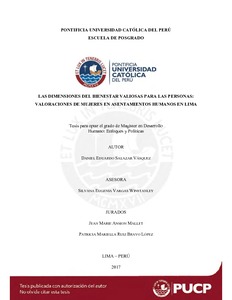| dc.contributor.advisor | Vargas Winstanley, Silvana Eugenia | |
| dc.contributor.author | Salazar Vásquez, Daniel Eduardo | es_ES |
| dc.date.accessioned | 2017-10-20T19:56:21Z | es_ES |
| dc.date.available | 2017-10-20T19:56:21Z | es_ES |
| dc.date.created | 2017 | es_ES |
| dc.date.issued | 2017-10-20 | es_ES |
| dc.identifier.uri | http://hdl.handle.net/20.500.12404/9563 | |
| dc.description.abstract | Muchos estudios discuten el concepto de bienestar, de la vida buena, y sus dimensiones,
pero muy pocos recurren a las personas mismas en lugar de a los expertos para entenderlos. Este
es el primer estudio, siguiendo el Enfoque de Capacidades, que pregunta directamente a las mujeres en el Perú sobre el significado y las dimensiones del bienestar para ellas. Este estudio tiene como objetivo encontrar las dimensiones más importantes del bienestar para las mujeres de dos asentamientos humanos en Lima, Perú. También discute su vida en los asentamientos humanos y busca darles voz a estas mujeres. Ya que recurre a los testimonios de las propias mujeres como la principal fuente de información, esta es una investigación cualitativa que utiliza entrevistas personales abiertas como su método. Los resultados muestran que son 10 las dimensiones más valiosas del bienestar para las mujeres entrevistadas. Si bien las dimensiones encontradas coinciden en su mayor parte con las encontradas por estudios similares que usan métodos participativos, tienden a diferir de las
dimensiones propuestas por los expertos. Los resultados también demuestran que el bienestar es entendido en términos sociales por estas mujeres. Se concluye que las discrepancias entre listas de expertos y testimonios de las personas evidencian la necesidad de más investigaciones participativas, especialmente si el objetivo es
lograr el tipo de vidas que las personas valoran, como lo es bajo el Enfoque de Capacidades. La metodología utilizada en este estudio puede servir de modelo para investigaciones de este tipo. Se concluye también que, en lugar de dispensar de listas propuestas por expertos, se necesita integrar ambos tipos de listas. Esto serviría para que nuestra comprensión del bienestar refleje tanto las valoraciones de las personas como dimensiones que la gente podría haber ignorado. | es_ES |
| dc.description.abstract | Many studies discuss the concept of wellbeing, of the good life, and its dimensions, but seldom do these studies resort to people themselves rather than to experts to understand them. This is the first study, following the Capability Approach, that directly asks women in Peru about the meaning and dimensions of wellbeing for them.
This study aims at finding the most important dimensions of wellbeing for women from
two shanty towns in Lima, Peru. It also discusses their life in shanty towns and seeks to give these women a voice. Since it resorts to the testimonies of the women themselves as the main source of information, it is qualitative research that uses personal open interviews as its method. The results show that the interviewed women conceive their wellbeing as having ten essential dimensions. While the dimensions found coincide for the most part with those found by similar studies using participatory methods, they tend to differ from the dimensions proposed by experts. Results also show that wellbeing is understood in social terms for these women. The study concludes that the mismatch between lists of experts and the testimonies of the
people calls for more participatory research, especially if the aim is to achieve the kinds of lives that the people value, as it is under the Capability Approach. The methodology used in this study can serve as a model for similar research. The study also concludes that, rather than dispensing with lists proposed by experts, the need is for integrating both kinds of lists. This is so that our understanding of wellbeing will both reflect the valuations of the people and include dimensions that people might have ignored. | es_ES |
| dc.language.iso | spa | es_ES |
| dc.publisher | Pontificia Universidad Católica del Perú | es_ES |
| dc.rights | Atribución-NoComercial-SinDerivadas 2.5 Perú | * |
| dc.rights | info:eu-repo/semantics/openAccess | es_ES |
| dc.rights.uri | http://creativecommons.org/licenses/by-nc-nd/2.5/pe/ | * |
| dc.subject | Mujeres--Perú--Lima--Condiciones sociales | es_ES |
| dc.subject | Estado de bienestar--Aspectos sociales--Perú | es_ES |
| dc.subject | Asentamientos humanos--Perú--Lima | es_ES |
| dc.subject | San Juan de Miraflores (Lima : Distrito)--Condiciones sociales | es_ES |
| dc.title | Las dimensiones del bienestar valiosas para las personas: valoraciones de mujeres en asentamientos humanos en Lima | es_ES |
| dc.type | info:eu-repo/semantics/masterThesis | es_ES |
| thesis.degree.name | Magíster en Desarrollo Humano: Enfoques y Políticas | es_ES |
| thesis.degree.level | Maestría | es_ES |
| thesis.degree.grantor | Pontificia Universidad Católica del Perú. Escuela de Posgrado | es_ES |
| thesis.degree.discipline | Desarrollo Humano: Enfoques y Políticas | es_ES |
| renati.discipline | 312257 | es_ES |
| renati.level | https://purl.org/pe-repo/renati/level#maestro | es_ES |
| renati.type | http://purl.org/pe-repo/renati/type#tesis | es_ES |
| dc.publisher.country | PE | es_ES |
| dc.subject.ocde | https://purl.org/pe-repo/ocde/ford#5.09.00 | es_ES |






